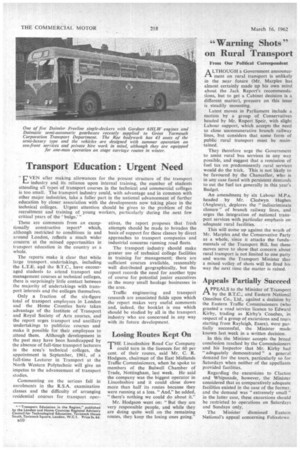Transport Education : Urgent Need
Page 44

If you've noticed an error in this article please click here to report it so we can fix it.
"
EVEN after making allowances for the present structure of the transport industry and its reliance upon internal training, the number of students attending all types of transport courses in the technical and commercial colleges is too small. The transport industry could, with advantage and in common with other major industries, take a fuller part in the national advancement of further education by closer association with the developments now taking place in the technical colleges. Urgent attention should be given to the problem of the recruitment and training of young workers, particularly during the .next few critical years of the bulge.'"
These are comments from an exceptionally constructive report* which, although restricted to conditions in and around London, reflects a much wider concern at the missed opportunities in transport education in the country as a whole.
The reports make it clear that while large transport undertakings, including the L.T.E. and the B.T.C., have encouraged students to attend transport and management courses at technical colleges, there is surprisingly little contact between the majority of undertakings with transport interests and the colleges themselves.
Only a fraction of the six-figure total of transport employees in London and the Home Counties have taken advantage of the Institute of Transport and Royal Society of Arts courses, and the report urges transport and ancillary undertakings to publicize courses and make it possible for their employees to attend them. Although development in the past may have been handicapped by the absence of full-time transport lecturers in the area's technical colleges, the appointment in September, I.96l, of a full-time Lecturer in Transport at the North Western Polytechnic will give an impetus to the advancement of transport studies.
Commenting on the serious fall in enrolments in the R.S.A. examination classes and the difficulty of arranging residential courses for transport oper atives, the report proposes that fresh attempts should be made to broaden the basis of support for these classes by direct approaches to transport companies and industrial concerns running road fleets.
The transport •industry should make greater use of technical college facilities in training for management; there are sufficient courses available, reasonably well distributed geographically, but the report records the need for another type of course for potential junior executives in the many small haulage businesses in the area.
Traffic engineering and transport research are associated fields upon which the report makes very useful comments and, indeed, the booklet is one which should be studied by all in the transport industry who are concerned in any way with its future development.
Losing Routes Kept On
THE Lincolnshire Road Car Company
could turn in the licences for 60 per cent, of their routes, said Mr. C. R. Hodgson, chairman of the East Midlands Traffic Commissioners, when he spoke to members of the Bulwell Chamber of Trade, Nottingham, last week. He said the company was the biggest operator in Lincolnshire and it could close down more than half its routes because they were running at a loss. "And," he added. "there's nothing we could do about it."
Mr. Hodgson went on: "But they are very responsible people, and while they are doing quite well on the remaining routes, they keep the losing ones going."




















































































































